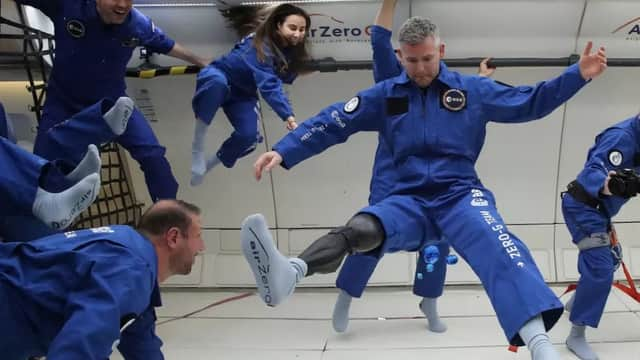John McFall: Paralympian turned astronaut is concerned his prosthetic leg could be poisonous on ISS


The world's first disabled astronaut will have tests carried out on his prosthetic leg by the European Space Agency (ESA) to ensure it does not poison the air by releasing toxic gases inside a space station.
John McFall, a former British Paralympian was selected to join the ESA in November 2022 and is currently undergoing astronaut training and a feasibility project to board the International Space Station (ISS).
Advertisement
Hide AdAdvertisement
Hide AdTo The Daily Telegraph, Mr McFall explained his prosthetic socket "is carbon fibre and it's got like a high-density foam on the inside", which could give out gases in the sealed space station.
He then said: "The carbon fibre socket is impregnated with a resin. The foam is made with polymers. Those materials will continue to give off gases to one degree or another and in an environment like the ISS where the air is constantly recycled, any significant amount of gases that are produced from a material will be amplified over a period of time because they're not filtered out."
The feasibility study looks to help the ESA assess the impact of being an amputee and wearing a prosthesis while living and working in space and test possible solutions to any problems.
The team originally thought that wearing a prosthesis in space may not be necessary but tests have shown it is likely to prove crucial for maintaining good fitness, balance, and for being able to evacuate quickly in an emergency.
Advertisement
Hide AdAdvertisement
Hide AdAstronauts’ bodies change in space because of microgravity, meaning Mr McFall’s legs could shrink or expand, and his prosthetic no longer fit - so he is undergoing tests to help mimic what may happen in space. A decision on whether Mr McFall will fly on a mission into space is expected to be made after the study ends in 2025.
Mr McFall lost his right leg in a motorcycle accident when he was 19 and went on to become a professional track and field athlete, competing for Great Britain and Northern Ireland at the Paralympic Games and winning a bronze medal at the Beijing Games in 2008.
Comment Guidelines
National World encourages reader discussion on our stories. User feedback, insights and back-and-forth exchanges add a rich layer of context to reporting. Please review our Community Guidelines before commenting.
